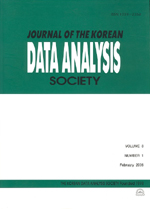현금흐름과 할인율에 의한 주식 수익률의 분해
Decomposition of Stock Returns using Cash-Flow and Discount-Rate News
- 한국자료분석학회
- Journal of The Korean Data Analysis Society (JKDAS)
- Vol.18 No.1
-
2016.02331 - 338 (8 pages)
- 27

본 연구는 Campbell, Vuolteenaho(2004)의 로그-선형 모형을 이용하여 우리나라의 주식 수익률을 현금흐름 뉴스와 할인율 뉴스로 분해하여 횡단면 회귀분석에 의해 가격화(priced) 여부를 검증한다. 시장 초과 수익률의 기대치 추정을 위한 벡터 자기회귀 모형의 내생변수는 시장 초과 수익률, 장부가치/시장가치 비율, 산업생산지수 성장률, 배당 수익률을 사용하여 상관관계가 매우 낮은 할인율 뉴스와 현금흐름 뉴스를 얻었다. 베타의 크기로 볼 때, 우리나라 주식 수익률은 현금흐름 뉴스보다는 할인율 뉴스에 더 민감하게 움직임을 알 수 있다. 로그-선형 모형에 의해 추정된 현금흐름 베타와 할인율 베타 중 할인율 베타만 통계적으로 유의적인 양(+)의 프리미엄을 가진다. 이는 우리나라에서는 주식 수익률이 현금흐름으로 표현된 배당보다는 할인율로 표현된 자본비용에 의해 결정된다는 것을 말한다. 이는 미국의 결과와는 배치되지만, 불안정한 배당 정책과 높은 부채 구조를 가지고 있는 우리나라의 기업 환경을 고려할 때 매우 의미 있는 결과다.
According to Campbell, Vuolteenaho (2004), this study decomposes unexpected market excess returns into cash-flow news and discount-rate news, and tests that their betas are priced by risk premiums using cross-sectional regressions. To estimate the expected market excess returns, this study employs a VAR (vector auto-regressive model) that use market excess returns, book-to-market ratios, growth rates of industrial production index, and log value of (1 + dividend yield) as endogenous variables. This VAR model decomposes market excess returns successfully in that it has relatively high adjusted R^2 and the very low correlation coefficient between the two news. Stock returns are likely to respond to discount-rate news more sensitively than cash-flow news. Discount-rate beta, not cash-flow beta, is priced by risk premium, which implies that discount-rate beta is bad beta and cash-flow beta is good beta in Korea. These findings are somewhat different from those of the U.S., however, they have important implications to the Korean stock market when considering the weak implication of dividend policy and high debt/equity ratios of Korean firms.
1. 서론
2. 자료 및 방법론
3. 현금흐름 및 할인율 뉴스와 베타의 추정
4. 횡단면 회귀분석에 의한 가격화 검증
5. 결론
References
(0)
(0)